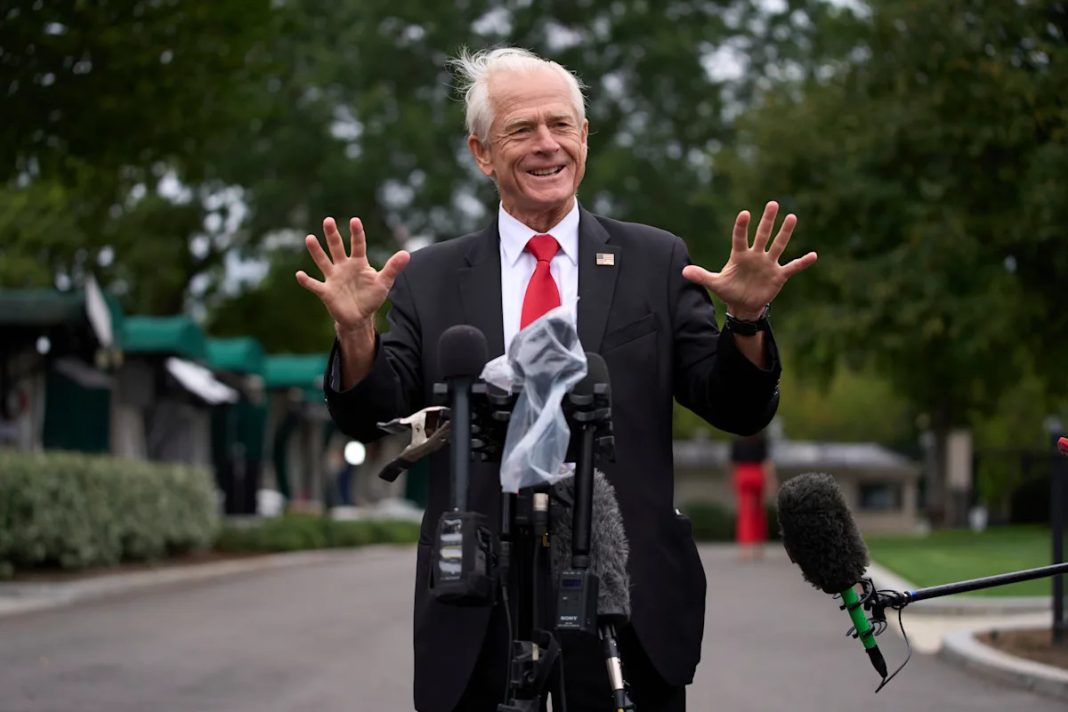Peter Navarro will not let this go.
The longtime economic adviser to President Donald Trump is a year removed from his four-month prison sentence for defying a subpoena from the Jan. 6 select committee. Navarro is back in the White House and on the airwaves defending Trump’s unprecedented tariff agenda. He’s become a hero to the MAGA base and written a small library of books about his legal saga. And the Trump-led Justice Department recently announced that it no longer stands behind the arguments that led to his conviction.
But Navarro wants more. In court papers filed Sunday, the Harvard-trained economist says the Justice Department’s terse and tepid reversal isn’t good enough. He wants his former prosecutors to explain exactly why they’ve changed course — particularly on the complicated issues of executive privilege and presidential immunity that led to his conviction in the first place.
Without that explanation, Navarro says, he’ll be deprived of a chance to vindicate his original argument: that his status as a senior presidential adviser to Trump should have shielded him from his contempt-of-Congress prosecution in the first place.
“The Department of Justice should not be allowed to disavow, without explanation or acknowledgment of its reasons, the positions it has pursued in this case for more than three years,” Navarro’s attorneys say. “When the Executive Branch abandons the positions it has aggressively advanced, the interests of candor, transparency, and fairness demand that it explain why.”
It’s an awkward dynamic. Navarro, who has said he doesn’t want a pardon from Trump, is actually inviting further conflict with a Justice Department prepared to let him off the hook.
Navarro in a statement said that his continued fight a matter of principle — one he says could govern the way current and future presidential advisers face investigations by adversarial Congresses or Justice Departments.
“If I lose, future presidential advisers of either party could face jail for honoring executive privilege and defending the Constitution’s separation of powers,” Navarro said in a statement to POLITICO.
The Justice Department revealed last month that it no longer wished to contest Navarro’s appeal of his conviction, simply saying it “has determined that it is no longer taking the same position as the prior administration in this case.” Prosecutors instead urged the D.C. Circuit Court of Appeals to appoint a stand-in attorney — known as an amicus curiae, or “friend of the court” — to continue litigating Navarro’s appeal.
But Navarro says no amicus should be appointed before the government explains itself — otherwise the stand-in lawyer would be operating blindly.
Navarro’s lawyers say the matter is simple: rules of legal ethics and Supreme Court precedent require the government to explain itself when it abandons a legal position. It’s in the interests of justice and to help guide the courts — such as when the Obama administration refused to defend the Defense of Marriage Act.
“Principles of fairness require more than silence,” his lawyers wrote.
Navarro’s legal odyssey has lasted nearly four years, beginning with a subpoena from the Jan. 6 committee in February 2022. The panel was eager for testimony about Navarro’s role in crafting a three-volume report alleging fraud in the 2020 election, which helped fuel President Donald Trump’s bid to seize a second term despite his defeat at the polls. Trump cited Navarro’s report in the same tweet urging his supporters to attend a “wild” protest in Washington on Jan. 6, 2021, an event that shortly thereafter morphed into the violent attack on the Capitol.
The Jan. 6 committee had also inquired about Navarro’s partnership with Steve Bannon — who was also convicted of contempt of Congress for defying the panel’s subpoena — to strategize with members of Congress about challenging Joe Biden’s electoral votes.
Navarro resisted the committee’s subpoena, claiming he was both immune as a senior presidential adviser and also that Trump intended to shield his testimony with an assertion of executive privilege. But the committee rejected Navarro’s claim, saying there was no evidence Trump had actually asserted privilege and emphasizing it wanted to talk to Navarro about many subjects unrelated to his communications with Trump, which were indisputably not subject to privilege claims.
Navarro was indicted in June 2022 after the House held him in contempt of Congress. He was convicted by a jury a year later.
The Justice Department separately sued Navarro to recover emails he sent on private accounts but related to government business. The Justice Department similarly abandoned that effort after Trump took office earlier this year.

